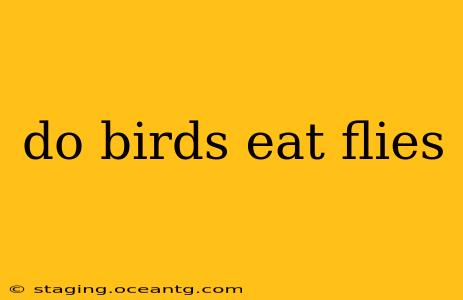Do Birds Eat Flies? A Deep Dive into Avian Diets
The simple answer is a resounding yes, many birds eat flies. However, the specifics of which birds eat flies, how they hunt them, and why flies are a part of their diet is far more complex and fascinating. This article will explore the world of avian insectivory, focusing on the role flies play in the diet of various bird species.
What Types of Birds Eat Flies?
A wide variety of birds include flies in their diet, although it's rarely their sole food source. The types of birds most likely to consume flies are insectivores, meaning their diet is primarily made up of insects. This group includes:
-
Flycatchers: These birds, as their name suggests, are masters at catching flies in mid-air. They often perch on a branch and dart out to snatch their prey. Examples include the Eastern Phoebe and the Great Crested Flycatcher.
-
Swallows: Known for their aerial acrobatics, swallows are highly efficient fly-catchers. They are swift and agile, capable of catching flies during flight with remarkable precision. Barn Swallows and Tree Swallows are common examples.
-
Warblers: Many warbler species are insectivores, and flies form a portion of their diet, especially during breeding season when they need extra protein to feed their young.
-
Wrens: These small, active birds often forage on the ground and in low vegetation, readily consuming flies and other insects they encounter.
-
Robins: While Robins are omnivores with a varied diet, they'll happily include flies, especially when feeding their chicks.
It's important to note that many other bird species, including some omnivores and even some carnivores, will opportunistically eat flies when the opportunity arises. A hungry bird isn't picky!
How Do Birds Catch Flies?
The methods birds employ to catch flies vary greatly depending on the species:
-
Aerial Pursuit: Flycatchers and swallows excel at aerial hunting. They use their sharp eyesight and quick reflexes to spot and capture flies in mid-air.
-
Gleaning: Some birds, such as wrens and warblers, glean flies from foliage, picking them off leaves and branches.
-
Ground Foraging: Certain species forage on the ground, searching for flies and other insects amongst leaf litter and vegetation.
-
Waiting and Ambushing: Some birds may perch and wait patiently for flies to come within striking distance before making a quick snatch.
Are Flies a Significant Part of a Bird's Diet?
The importance of flies in a bird's diet varies considerably. For some insectivorous species, flies may constitute a substantial portion of their food intake, particularly during certain times of the year. For others, flies are merely a supplementary food source, a convenient snack when other prey is scarce. The availability of flies and other insect prey also dictates their importance in the bird’s diet.
What Other Insects Do Birds Eat?
Birds' diets are rarely limited to just one type of insect. While flies are a common component, many birds also consume:
- Mosquitoes: A favorite for many insectivorous birds.
- Moths and Butterflies: A significant food source, especially for nocturnal birds.
- Beetles: Commonly found in various habitats and readily consumed by many bird species.
- Grasshoppers and Crickets: Another important food source, especially in grassland habitats.
This varied insect diet highlights the crucial role birds play in maintaining ecological balance, acting as natural pest control within their environment. The consumption of flies is just one facet of this complex relationship.
